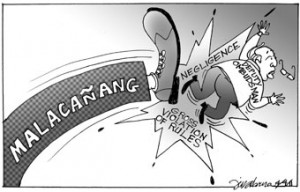Impunity is a hard habit to br
Using the findings of the Incident Investigation and Review Committee, the inter-agency task force chaired by Justice Secretary Leila de Lima which probed the mishandling of the hostage-taking incident in Rizal Park that claimed the lives of eight Hong Kong tourists last Aug. 23, the Office of the President found Gonzalez responsible for triggering the hostage-taking in the first place, by failing to act expeditiously on a motion filed by former policeman Rolando Mendoza. Instead of the five days mandated by the Ombudsman’s own procedures, the IIRC determined that Gonzalez had allowed “Mendoza’s motion for reconsideration to languish for nine months without any justification.” Deep frustration over the delay drove Mendoza to take the tourists hostage.
Assistant Ombudsman Jose de Jesus, the same spokesman who defended then-Ombudsman Aniano Desierto against charges he was intentionally undermining the cases his office filed before the Sandiganbayan (a pattern this newspaper called the “Ombudscam”), adopted the same no-holds-barred approach to his defense of Gonzalez.
To be sure, De Jesus was on less-shaky legal ground when he said it was not yet time to implement the order of dismissal. “We will not yet implement the decision of the President of the Philippines because this is not yet final and executory.”
But this simple, straightforward, process-oriented answer was swamped by De Jesus’ political pronouncements.
Reading from a press statement, De Jesus said the Ombudsman’s office had considered “the matter of Gonzalez’s culpability in the hijacking episode as legally final and closed.” He added: “What we are saying is that [the Palace decision] is conflicting with the earlier decision of the Office of the Ombudsman—with all due respect to the decision of the Office of the President—exonerating Deputy Ombudsman Gonzalez from the charge.”
To which the only proper response is: So what? Is the Office of the Ombudsman a new and co-equal branch of government? To say that its decision conflicts with the position of the President—and we ought to recognize that the order of dismissal “was approved by authority of the President”—is to assume that the two offices are equal, and that the presidency’s unchallenged authority to remove non-impeachable officials does not apply to the Ombudsman’s domain.
In fact, that is exactly what De Jesus argued last Friday. To quote the Inquirer report: “De Jesus said that under the law, the Office of the Ombudsman has disciplinary authority over all appointive officials of the government, except over officials who may be removed only by impeachment and over members of Congress or the judiciary.”
Gutierrez’s spokesman has since turned down the volume of defiance by several notches. On Saturday, he issued a clarification: “We never said that we are a coequal branch of the government though we are an independent agency of the government and free from any political interference in the performance of our duties and functions. What we said earlier to the media was we cannot implement the decision because it has not yet become final.” What about all that talk about “conflicting” decisions? Conflict is material only when the two agencies of government are co-equal; when they are not, the position of the higher office must hold sway.
Senate President Juan Ponce Enrile, not exactly a rookie when it comes to legal questions, categorically described the Ombudsman’s response as defiance, and offered advice to Gutierrez, now impeached and facing trial in the Senate next month. “If I were her, I won’t join the fray because she’s facing a case.”
But years of misusing the awesome powers of the Ombudsman to prosecute lowly officials and protect the higher-ups have taken their toll on the Ombudsman and her lawyers. Last Friday’s knee-jerk reaction tells us the instinct to clear the high and mighty is already second nature.